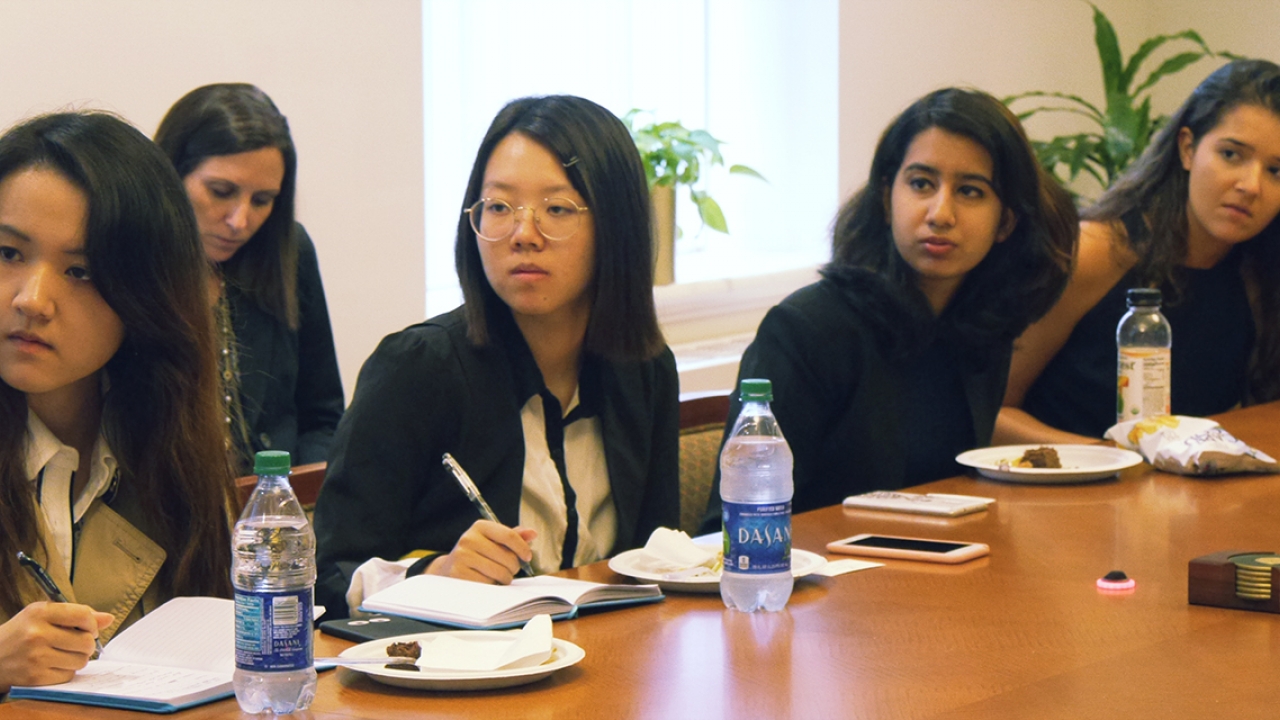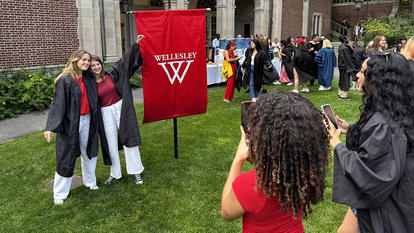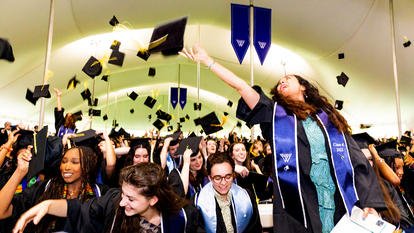Wellesley’s New Summer Leadership Program Starts Young Women on the Journey to Becoming a Leader

“Great leaders create their own paths to success,” said Nancy Coleman, associate provost and director of strategic growth initiatives at Wellesley. “They understand that becoming a leader is a process.”
Coleman created Wellesley’s new Contemporary Women’s Leadership program, which launched this summer, to give college students from around the world a taste of the Wellesley experience and to help them learn to become leaders. This year, six students from China, two from India, and three from the United States participated in the program; it began in late June and featured four weeks of classroom instruction plus a week of experiential learning. In typical Wellesley fashion, the program allowed for plenty of personalized attention.
“Students at the undergraduate level often take classes about leadership, but these classes tend to fall short in their ability to move beyond a theoretical focus,” said Coleman. “My team and I wanted to create a program where students see how concepts they learn in the classroom translate into the workplace.”
Participants, who lived in Stone-Davis, took two courses with Wellesley faculty for which they earned college credit.
In Introduction to Women’s and Gender Studies, taught by Elena Tajima Creef, professor of women’s and gender studies and department chair, students learned the historical context of gender inequalities in the United States and how womanhood is represented in popular culture, myths, and ads. They also examined the effects of inequities in the workplace and the role of individuals in perpetuating or challenging stereotypes.
In Organizational Psychology with Linda Carli, senior lecturer in psychology, students explored the elements of good leadership—such as instilling pride in their colleagues and communicating a mission or purpose—as well as how the social environment of the workplace, motivation and morale, and workforce demographics can influence people’s behavior at work.
“Women do not differ from men in the personality traits most predictive of good leadership—extraversion and intelligence—and they are slightly more likely than men to be transformational and to be concerned with ethics,” said Carli in an interview. “The route to being an effective leader is based on acquired skills. So with effort and determination, anyone can become a better communicator, influence agent, mentor, and leader.”
After they completed the two courses, the students spent the fifth week of the program learning about different leadership styles through seminars and discussions with women, including Wellesley alumnae, who have been successful in their careers.
For example, the group visited First Republic Bank in Boston, where several women leaders in the financial world, including host Karen Bratt ’85 and Elyse Cherry ’75, discussed topics such as their career trajectories and the importance of preparation and smart risk-taking.
In a panel discussion at Wellesley, marketing and media experts Bethany Branon, assistant vice president of digital marketing at Unum; Stephanie Kaplan Lewis, co-founder, CEO, and editor-in-chief of HER Campus; and Michelle Dunham, marketing supervisor at The TJX Companies, addressed how they’ve excelled in their fields without compromising their beliefs about equality and the need for positive depictions of women.
Students also participated in a service learning workshop and volunteered at Greater Boston Food Bank, the largest hunger-relief organization in New England. There, they met with CEO Catherine D’Amato, who described the challenges and rewards of working in the nonprofit world.
Leeza Gibbons, former co-host of Entertainment Tonight and author of the book Fierce Optimism, gave a keynote speech that was open to the entire Wellesley community. She shared how she has overcome challenges throughout her career, beginning when she was a broadcasting student who wanted to be a TV journalist like Barbara Walters. One of her peers, she recalled, said, “Come on, Leeza. You’re not even going to get out of town; that’s not going to be you.”
Time and again, Gibbons said, she had to ignore naysayers, including fellow contestants on the seventh season of Celebrity Apprentice who thought she would not be a serious contender because she was too nice. In fact, she won the competition.
“I believe the people who get ahead are the ones who know where they want to go and what they are willing to do and not do to get there. We never need to sabotage others to claim our own success,” said Gibbons.
“The fifth week gave us each a glimpse of what our future could look like. There was someone that everyone really identified with,” said program participant Becca Pachl, from Hotchkiss, Colo. She felt particularly inspired by the marketing/media panel. “I have been interested in marketing, but I couldn’t envision myself in that field because it seemed like a large part of it marginalized women,” she said. “So it was empowering to meet three women I aspire to be like someday, who used their platforms to help women. I’m still emailing with one of them.”
Pachl said she and other students also appreciated the “golf for business” seminar at Wellesley’s Nehoiden Golf Club, led by Leslie Andrews ’82, an LPGA teaching professional. “She taught us how to swing a club and how to play golf, so now we can all say, ‘Yes, I play golf,’ if asked in a business setting,” Pachl said. “Leslie emphasized that you have to jump at an opportunity in order not to be passed over. You have to put your hand up and say, ‘Yes, I can do this,’ and that’s a lesson that applies to much more than golf.”
Aqsa Pervez, a student at Ashoka University in India, a partner school with Wellesley, said she was inspired to “see all these women out there achieving what they want,” despite the many challenges they face: “They said there is a lot of hope for us.”
She also valued the four weeks of classes, which helped her understand “where discrimination toward women comes from and how to address it in a workplace setting,” she said.
Such comments delight Coleman, who hopes to partner with several more international institutions next year, increasing the number of women who can take the Wellesley experience back to their home countries. She said the most important lesson for all students, though, is that “leadership is a lifelong journey.”



